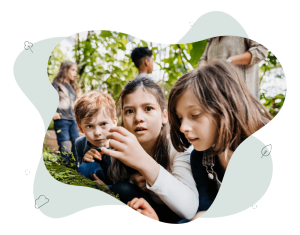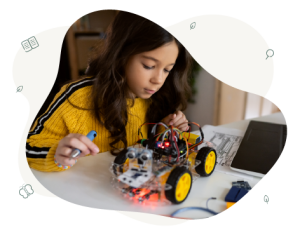16 Science and STEMM
Play-based learning is advocated as an approach that fosters science and technology education. Experiential inquiry in science and technology supports students to develop an interest in the world around them (Campbell, Jobling & Howitt, 2021; Sliogeris & Almeida, 2017).
Outdoor play, in particular, engages students with the knowledge of the world around them, allowing them to observe and explore changes, patterns, and properties of objects.
In the last decade, the outdoor space as a site of learning has been experiencing a renaissance as early childhood settings and schools are rediscovering the potentials of outdoor spaces. This has been realised in many ways, one way is through the establishment of Bush schools and Bush kindergartens. In parts of Europe the schools are often referred to as Forest schools or Forest Kindergartens. There are many principles underpinning these programs. One key principle in these teaching and learning communities, is that as children play, engagement with the outdoor setting catalyses children’s curiosity about the natural world.

The teacher’s role in supporting capability building
A teacher’s role in this area can support students’ exploration and application of scientific and STEM (Science, Technology, Engineering, Mathematics) knowledge. In STEM play-based learning experiences, teachers can:
- Provide opportunities in the environment to engage with digital technologies in new, dynamic ways that support multi-modal learning, meaning-making, and representative thinking (Arnott & Yelland, 2020).
- Provide opportunities to explore a concept they are enquiring about through pretend play. For example, students inquiring into topics about insects, animals, or plants could benefit from opportunities to creatively extend their thinking through relevant toys and materials. Teacher-selected resources (such as insect or animal figurines, sticks and loose parts) can prompt students to further explore their knowledge in an imaginary context.
- Provide opportunities for students to extend their inquiry by offering tools for investigation. For example, magnifying glasses, books, iPads with YouTube or encyclopedia applications set up (Sliogeris & Almeida, 2017).
- Prompt students to document their findings and share them with the class.


